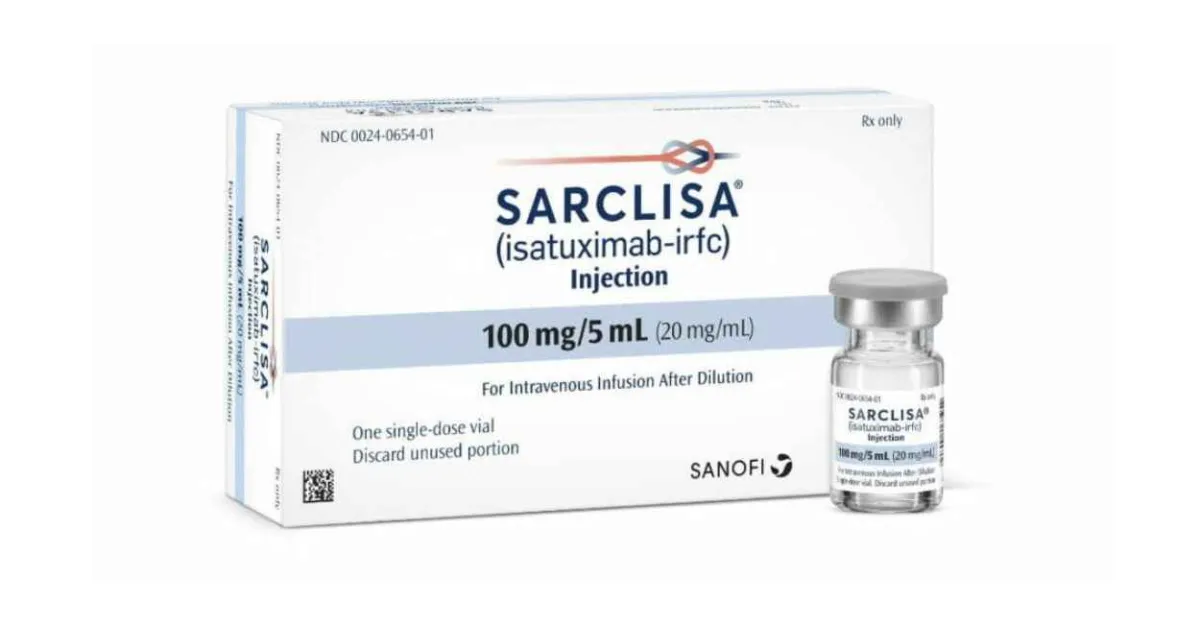The Phase 3 IMROZ trial evaluating the investigational use of Sarclisa (isatuximab) in combination with standard-of-care bortezomib, lenalidomide and dexamethasone (VRd) met its primary endpoint at a planned interim analysis for efficacy, demonstrating statistically significant improvement in progression-free survival (PFS) compared with VRd alone in transplant-ineligible patients with newly diagnosed multiple myeloma (MM). This is also the second Phase 3 trial investigating Sarclisa in newly diagnosed patients to show superiority versus standard of care.
Thierry Facon, MD Professor of Haematology in the Department of Haematology, Lille University Hospital, Lille, France, member of French Academy of Medecine and IMROZ Principal Investigator :
“The IMROZ trial outcome is promising for patients with newly diagnosed multiple myeloma who are transplant-ineligible, as there remains a significant unmet need for potential new therapies. First line therapeutic options are critical for all patients, but especially for those who are transplant-ineligible, given attrition rates in subsequent lines of therapy.”
The safety and tolerability of Sarclisa observed in this trial was consistent with the established safety profile of Sarclisa and VRd.
Dietmar Berger, MD, PhD Global Head of Development, Sanofi
"This is the second Phase 3 trial investigating Sarclisa in newly diagnosed patients to show superiority versus standard of care, reinforcing our belief in Sarclisa as a best-in-class medicine. These data underscore our commitment to advancing scientific innovation for people living with multiple myeloma, and we look forward to sharing more detail on Sarclisa’s potential to improve outcomes for patients receiving earlier lines of therapy.”
Sarclisa is a monoclonal antibody that binds to a specific epitope on the CD38 receptor on multiple myeloma (MM) cells, inducing distinct antitumor activity. It is designed to work through multiple mechanisms of action including programmed tumor cell death (apoptosis) and immunomodulatory activity. CD38 is highly and uniformly expressed on the surface of MM cells, making it a potential target for antibody-based therapeutics such as Sarclisa.
Based on the Phase 3 ICARIA-MM study, Sarclisa is approved in >50 countries, including the U.S. and EU, in combination with pomalidomide and dexamethasone for the treatment of patients with relapsed refractory MM (RRMM) who have received ≥2 prior therapies, including lenalidomide and a proteasome inhibitor and who progressed on last therapy. Based on the Phase 3 IKEMA study, Sarclisa is also approved in 50 countries in combination with carfilzomib and dexamethasone, including in the U.S. for the treatment of patients with RRMM who have received 1–3 prior lines of therapy and in the European Union for patients with MM who have received at least 1 prior therapy. In the U.S., the generic name for Sarclisa is isatuximab-irfc, with irfc as the suffix designated in accordance with Nonproprietary Naming of Biological Products Guidance for Industry issued by the U.S. Food and Drug Administration (FDA).
Sarclisa continues to be evaluated in multiple ongoing Phase 3 clinical trials in combination with current standard treatments across the MM treatment continuum. It is also under investigation for the treatment of other hematologic malignancies, and its safety and efficacy have not been evaluated by any regulatory authority outside of its approved indication.
About the IMROZ trial
The randomized, multi-center, open label Phase 3 IMROZ clinical trial enrolled 484 patients with newly diagnosed transplant-ineligible MM across 104 centers spanning 21 countries. During the trial, Sarclisa was administered through an intravenous infusion at a dose of 10 mg/kg once weekly for five weeks during first 42-day cycle and once every two weeks in cycles 2 to 4 in combination with subcutaneous bortezomib, oral lenalidomide and intravenous or oral dexamethasone. Then Sarclisa was administered every 2 weeks from cycle 5 to 17 and every 4 weeks in cycles 18+ during 28-day cycles in combination with lenalidomide and dexamethasone at the standard dose, until disease progression, unacceptable safety profile or patient’s decision to stop the study treatment. The primary endpoint of IMROZ is progression-free survival. Key secondary endpoints include complete response rate, minimal residual disease negativity rate for patients with a complete response, very good partial response or better rate, overall survival. Other secondary endpoints are: overall response rate, time to progression, duration of response, time to first response, time to best response, progression-free survival on next line of therapy, progression-free survival by MRD status, sustained MRD negativity greater than or equal to 12 months rate, safety, pharmacokinetic profile, immunogenicity, disease-specific and generic health-related quality of life, disease and treatment-related symptoms, health state utility, and health status.














